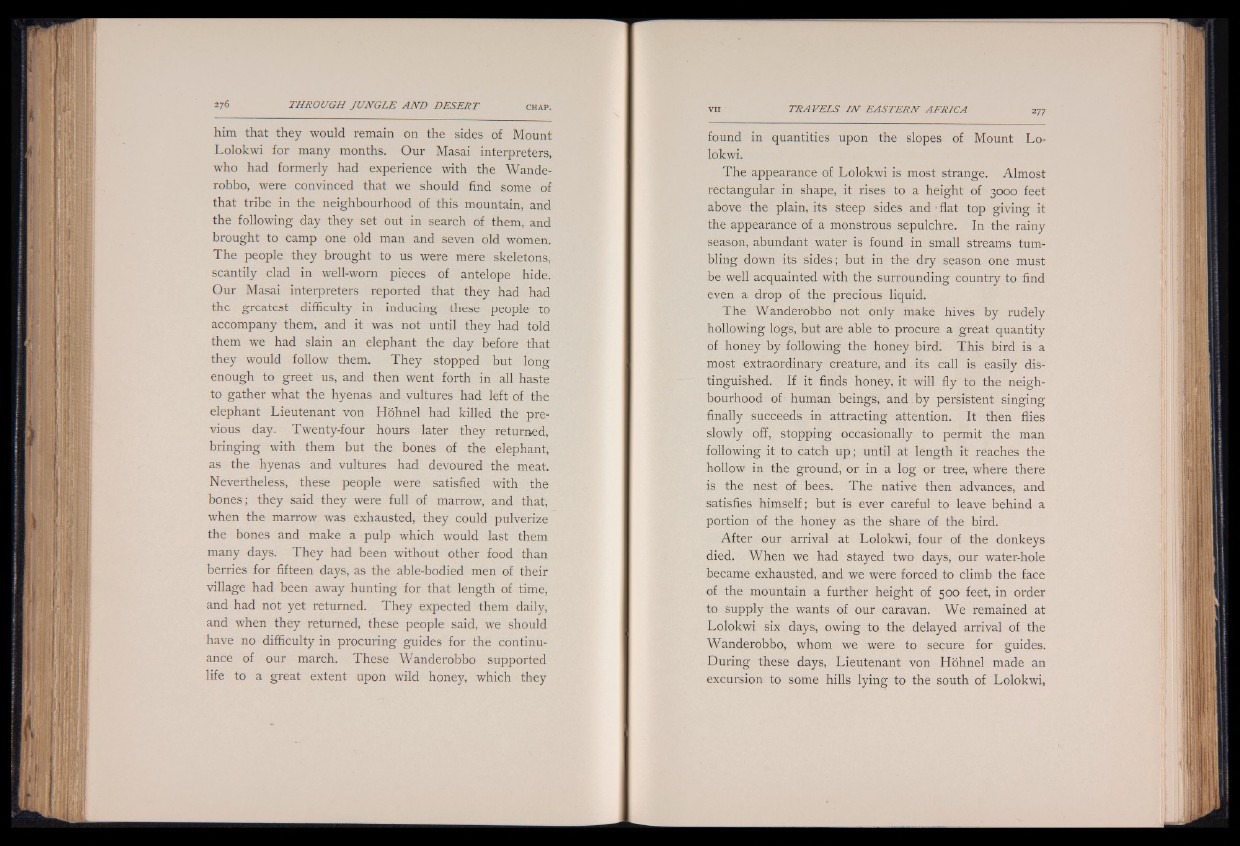
him that they would remain on the sides of Mount
Lolokwi for many months. Our Masai interpreters,
who had formerly had experience with the Wande-
robbo, were convinced that we should find some of
that tribe in the neighbourhood of this mountain, and
the following day they set out in search of them, and
brought to camp one old man and seven old women.
The people they brought to us were mere skeletons,
scantily clad in well-worn pieces of antelope hide.
Our Masai interpreters reported that they had had
the greatest difficulty in inducing these people to
accompany them, and it was not until they had told
them we had slain an elephant the day before that
they would follow them. They stopped but long
enough to greet us, and then went forth in all haste
to gather what the hyenas and vultures had left of the
elephant Lieutenant von Hohnel had killed the previous
day. Twenty-four hours later they returned,
bringing with them but the bones of the elephant,
as the hyenas and vultures had devoured the meat.
Nevertheless, these people were satisfied with the
bones; they said they were full of marrow, and that,
when the marrow was exhausted, they could pulverize
the bones and make a pulp which would last them
many days. They had been without other food than
berries for fifteen days, as the able-bodied men of their
village had been away hunting for that length of time,
and had not yet returned. They expected them daily,
and when they returned, these people said, we should
have no difficulty in procuring guides for the continuance
of our march. These Wanderobbo supported
life to a great extent upon wild honey, which they
found in quantities upon the slopes of Mount Lolokwi.
The appearance of Lolokwi is most strange. Almost
rectangular in shape, it rises to a height of 3000 feet
above the plain, its steep sides and ■ flat top giving it
the appearance of a monstrous sepulchre. In the rainy
season, abundant water is found in small streams tumbling
down its sides; but in the dry season one must
be well acquainted with the surrounding country to find
even a drop of the precious liquid.
The Wanderobbo not only make hives by rudely
hollowing logs, but are able to procure a great quantity
of honey by following the honey bird. This bird is a
most extraordinary creature, and its call is easily distinguished.
If it finds honey, it will fly to the neighbourhood
of human beings, and by persistent singing
finally succeeds in attracting attention. It then flies
slowly off, stopping occasionally to permit the man
following it to catch up ; until at length it reaches the
hollow in the ground, or in a log or tree, where there
is the nest of bees. The native then advances, and
satisfies himself; but is ever careful to leave behind a
portion of the honey as the share of the bird.
After our arrival at Lolokwi, four of the donkeys
died. When we had stayed two days, our water-hole
became exhausted, and we were forced to climb the face
of the mountain a further height of 500 feet, in order
to supply the wants of our caravan. We remained at
Lolokwi six days, owing to the delayed arrival of the
Wanderobbo, whom we were to secure for guides.
During these days, Lieutenant von Hohnel made an
excursion to some hills lying to the south of Lolokwi,